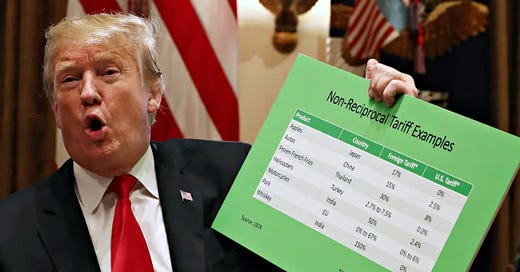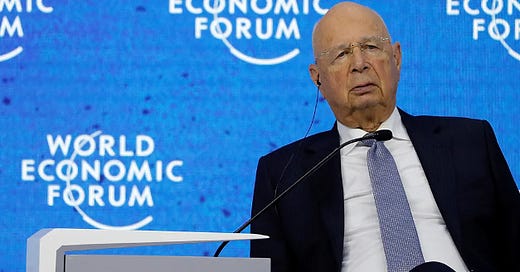
An Austrian Perspective on Tariffs
"Imposing tariffs for the sake of addressing a trade imbalance will not resolve the underlying cause, which is typically a loss of competitiveness in the entire industry or in specific goods."
By Allen Gindler, Mises Institute
Tariffs have been a key instrument in government trade policies for centuries. For instance, one of the wealthiest ancient countries, Khazaria (7th-10th centuries CE), did not tax its citizens directly but instead imposed tariffs on all passing caravans due to its strategic location along major trade routes. In the United States, before introducing the federal income tax (1913), the government generated revenue primarily through tariffs. The role of tariffs is widely debated today, especially during election periods.
What Are Tariffs?
A tariff is, in essence, a tax imposed by a government on goods and services imported from other countries. The main purpose of tariffs is to make imported goods more expensive, thereby protecting domestic industries from foreign competition, to raise government revenue, and/or to influence trade policies. Tariffs can be broken down into two main types:
Specific tariffs: a fixed fee imposed per unit of imported goods (e.g., $100 per ton of imported steel)
Ad valorem tariffs: a percentage of the value of the imported goods (e.g., 10 percent on imported electronics).
Historically, tariffs were one of the primary sources of revenue for governments. Today, although their revenue-generating role has diminished, they are still used to protect domestic industries, control trade balances, and as leverage in international negotiations.
How Tariffs Work
When a company imports goods subject to tariffs, it must pay the tariff at the border, typically to customs authorities, before the goods are cleared. This means companies often pay the tariff upfront before selling the goods in the domestic market. When a tariff is imposed, it raises the cost of imported goods at the point of entry, which has several effects on the economy:
Raising Prices for Consumers
The most direct effect of tariffs is that they often make imported goods more expensive. Importers—facing higher costs because of tariffs—typically attempt to pass these costs on to consumers in the form of higher prices. For instance, if a 10 percent tariff is placed on imported cars, the price of those cars may rise by a similar amount. However, this increase is not always guaranteed, as market dynamics often prevent the transfer of the additional costs to consumers.
Protecting Domestic Producers
By making foreign goods and factors more expensive, tariffs create a protective barrier for domestic industries. Domestic producers can try to increase their prices, as the cost of imported alternatives rises. For instance, if tariffs are imposed on imported steel, domestic steel manufacturers benefit because the higher price of imported steel makes their products more attractive, even if they are more expensive than they would be in a fully open market.
Retaliatory Tariffs and Trade Wars
Tariffs can also spark retaliatory measures from trading partners, leading to trade wars. When one country imposes tariffs, affected nations may respond by placing tariffs on goods exported by the initial country, which escalates the situation. Trade wars can disrupt international supply chains, raise costs for businesses and consumers, and reduce economic growth.
Market Dynamics and Tariffs: Passing on Costs
Often, however, the costs of tariffs cannot be truly passed on to consumers. The extent to which the burden of tariffs is transferred depends on market dynamics, such as competition and consumer demand. In highly-competitive industries, companies may absorb the costs of tariffs to maintain their market share, sacrificing profit margins rather than risking losing customers to competitors. This pushes up production costs, hampers market dynamics, and may even push firms out of business.
The Austrian Approach to Tariffs and Comparative Advantage
The Austrian School of economics advocates for minimal government intervention in markets, promotes free trade, and supports individual liberty. Austrian economists view tariffs as detrimental to the natural efficiency of the market, because they distort price signals and lead to the misallocation of resources. Murray Rothbard explained that “Tariffs injure the consumer with the ‘protected’ area, who are prevented from purchasing from more efficient competitors at a lower price.”
The Austrian critique of tariffs is heavily rooted in the concept of comparative advantage, which argues that countries should specialize in producing goods where they are relatively more efficient. Even if a country is more efficient at producing all goods than another country, both can still benefit from trade if each specializes in goods for which it has a comparative advantage. This principle—originally developed by David Ricardo—emphasizes that trade allows for a more efficient allocation of global resources, lowering production costs and increasing prosperity for all participants.
In the context of comparative advantage, consider two countries—Country A and Country B—both of which produce electronics and textiles. Suppose Country A requires 8 hours to produce 1 unit of electronics and 4 hours for 1 unit of textiles. Country B, however, requires 10 hours to produce 1 unit of electronics and 8 hours for 1 unit of textiles.
Even though Country A is more efficient in producing both electronics and textiles, the principle of comparative advantage suggests that each country should specialize based on where they have a relative advantage. For Country A, the opportunity cost of producing 1 unit of electronics is 2 units of textiles (8/4). For Country B, the opportunity cost of producing 1 unit of electronics is 1.25 units of textiles (10/8). Thus, even though Country A is absolutely better at producing both goods, it is relatively better at producing textiles, while Country B is relatively better at producing electronics. If both countries specialize accordingly—Country A in textiles and Country B in electronics—and then trade, they can both enjoy more of each good than if they tried to produce both themselves.
However, if Country A imposes a 20 percent tariff on imported electronics from Country B, the cost of those imported electronics increases, making them less competitive in Country A’s market. This could cause Country A to shift resources inefficiently back into electronics production, even though it is less cost-effective than focusing on textiles. This illustrates how tariffs can disrupt the natural efficiency of trade and specialization, leading to suboptimal outcomes for both countries.
In general, from an Austrian perspective, tariffs distort price signals, which are essential for the efficient allocation of resources in a market economy. Prices in a free market reflect the underlying scarcity of goods, consumer preferences, and production costs. Tariffs, by artificially inflating the price of imported goods, disrupt these signals and lead consumers and producers to make inefficient choices.
Imposing tariffs for the sake of addressing a trade imbalance will not resolve the underlying cause, which is typically a loss of competitiveness in the entire industry or in specific goods. Tariffs make these industries even less competitive than they were before tariff imposition. Moreover, creating a “protective area” will force other companies to flock into protected industries, essentially depriving established firms of their initial monopolist benefits while leaving the overall misallocation of production and harm to consumers intact. Rothbard explained, “In the long run, therefore, a tariff per se does not establish a lasting benefit even for the immediate beneficiaries.”
Austrian Approach and National Security Concerns
While Austrian economists emphasize the efficiency of free markets and the advantages of comparative advantage, the case for free trade becomes more nuanced when national security concerns arise. Unfortunately, when national security is supposedly at stake, economic priorities often yield to political and strategic imperatives. Throughout history, political instability and conflicts have led governments to emphasize self-sufficiency over market efficiency, particularly in industries claimed to be vital to defense. During such times, the state uses “national defense” as a pretext for profound and widespread interference in the economy.
With modern states, war spending is determined by central planning and is not determined by consumer demand or guided by private markets. Thus, any approach to “national defense” will inevitably diverge from the Austrian preference for minimal intervention. However, it is hard to imagine that war preparation would go unnoticed, and if a nation depends completely on a particular resource from an unfriendly country, the market price of that product would skyrocket. This, in turn, would signal entrepreneurs to either stockpile large quantities of the resource at current prices, seek alternative suppliers that were previously ignored because of prohibitive costs, or seize the opportunity to revive domestic production.
The reliance on administrative measures often stems from a belief that market forces cannot respond quickly or effectively to crises, leading to policies that distort incentives and stifle innovation. By undermining price signals, governments often create monopolies or grant undue privileges to certain industries, consolidating power in ways that harm overall economic efficiency. This skepticism of market mechanisms reflects a fundamental misunderstanding of their adaptability and the profound role they play in dynamically coordinating resources, even under the pressures of wartime.
QTR’s Disclaimer: Please read my full legal disclaimer on my About page here. This post represents my opinions only. In addition, please understand I am an idiot and often get things wrong and lose money. I may own or transact in any names mentioned in this piece at any time without warning. Contributor posts and aggregated posts have been hand selected by me, have not been fact checked and are the opinions of their authors. They are either submitted to QTR by their author, reprinted under a Creative Commons license with my best effort to uphold what the license asks, or with the permission of the author.
This is not a recommendation to buy or sell any stocks or securities, just my opinions. I often lose money on positions I trade/invest in. I may add any name mentioned in this article and sell any name mentioned in this piece at any time, without further warning. None of this is a solicitation to buy or sell securities. I may or may not own names I write about and are watching. Sometimes I’m bullish without owning things, sometimes I’m bearish and do own things. Just assume my positions could be exactly the opposite of what you think they are just in case. If I’m long I could quickly be short and vice versa. I won’t update my positions. All positions can change immediately as soon as I publish this, with or without notice and at any point I can be long, short or neutral on any position. You are on your own. Do not make decisions based on my blog. I exist on the fringe. The publisher does not guarantee the accuracy or completeness of the information provided in this page. These are not the opinions of any of my employers, partners, or associates. I did my best to be honest about my disclosures but can’t guarantee I am right; I write these posts after a couple beers sometimes. I edit after my posts are published because I’m impatient and lazy, so if you see a typo, check back in a half hour. Also, I just straight up get shit wrong a lot. I mention it twice because it’s that important.


















The problem with this type of anti-tariff argument is that it ignores second-order effects. A good produced more efficiently elsewhere may cost less than producing that good here. If my job is exported to produce that good, however, I have no money to buy that less-expensive, more-efficiently-produced good. Both sides lose: the manufacturer of the good and me.
A $100 manufacture that I cannot buy because my job was offshored is of less value to me and the community than a $125 manufacture made in my community that I can buy with wages from my onshore job. The manufacture of that good provides a paycheck and ability to pay for groceries and a mortgage, which allows grocery and banking jobs as it acts as a multiplier.
If we want a first-world country, we must pay first-world wages. If we must tariff incoming good to provide those first-world wages to our communities - enabling jobs, family formation, education, infrastructure… then tariffs are the right answer. Looking at tariffs only as a cost is to ignore the jobs and society we must have to ensure our own future - rather than just a cheaper good we can’t afford and that siphons income out of our family, community, country.
China doesn't sell us cheap goods produced under shocking conditions for most of their workers to be kind to us, the policy has been economic war for decades and we've swallowed it hook, line and sinker. Amazon etc are simply helping China in the wealth/skills transfer from West to East. There is only one eventual outcome.